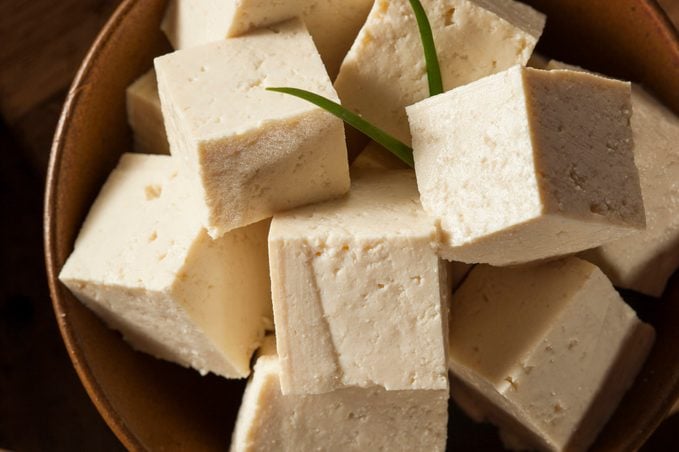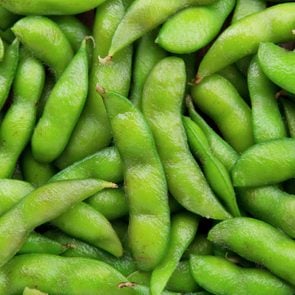8 Tofu Health Benefits You Should Know
Updated: Jun. 08, 2021
Find out why tofu is a healthy addition to any diet. Plus: Quick and easy recipes and tips for making tofu taste great.
Our editors and experts handpick every product we feature. We may earn a commission from your purchases.
Tofu is trending
Maybe it’s our obsession with plant-based protein. Or maybe it’s the allure of food that’s quick, healthy, and convenient. But tofu is having a moment. In the first half of 2020, tofu sales skyrocketed by 40 percent. And the trend shows no signs of slowing down, according to a market analysis published in 2019 by Grand View Research
“Tofu is a fabulous plant protein option for everyone,” says Desiree Nielsen, RD, author of Eat More Plants: Over 100 Anti-Inflammatory, Plant-Based Recipes for Vibrant Living. “It’s seriously underrated because it’s up against new ‘meatier’ plant-based options such as Beyond Beef.” These new meat substitutes come with a surprising amount of saturated fat and salt, she says. So tofu is a less-processed, healthier alternative.
Where does tofu come from?
Tofu (aka bean curd) may be a decades-old option in the United States, but it’s been a protein staple in Asia for centuries. Tofu got its start in China in roughly 220 B.C. Since then, its popularity has skyrocketed, making it a go-to protein in Japanese, Korean, and Southeast Asian cuisines.
If you haven’t tried tofu yet, here are eight reasons to give it a go.
Benefit: Tofu has a super-short ingredient list
What, exactly, is tofu anyway? It’s basically solidified soy milk. Tofu is made by boiling soybeans in water to create a milky liquid. Next, coagulants like calcium sulfate are added to form curds. Finally, those curds are drained, pressed into molds, and cut into squares to become the jiggly, white blocks we know as tofu.

Benefit: Tofu is loaded with nutrition
A 1.2 cup serving of tofu contains:
Calories: 94 (5 percent daily value, or DV)
Total fat: 5.9 g (9 percent DV)
Saturated fat: 0.9 g (4 percent DV)
Cholesterol: 0 mg (0 percent DV)
Carbohydrate: 2.3 g (1 percent DV)
Dietary fiber: 0.4 (1 percent DV)
Protein: 10 g (20 percent DV)
Sodium: 8.7 mg (0 percent DV)
Tofu is also a great way to rack up these healthful nutrients:
Complete plant protein
“Soy foods like tofu are unique in that they have the highest protein quality among plant proteins,” says Sharon Palmer, RDN, a registered dietitian nutritionist specializing in plant-based nutrition and sustainable living. “Just like meat, fish, poultry, eggs, and dairy, tofu contains good amounts of all the amino acids your body needs to manufacture its own protein supply.”
Isoflavones
“Isoflavones are another word for the antioxidants in soy,” says Ginger Hultin, RDN, a Seattle-based registered dietitian nutritionist. “These compounds may decrease inflammation and are likely responsible for many of soy’s health benefits.”
Calcium
“Depending on the type of coagulant used to set the tofu, it may contain as much as 30 percent of the RDA for calcium,” says Alex Caspero, RD, a registered dietitian and plant-based chef in St. Louis, Missouri.
Benefit: Tofu is heart healthy
“There’s a reason the American Heart Association recommends consuming soy foods like tofu,” says Caspero. “Soy can reduce both total and ‘bad’ LDL cholesterol.” A 2020 Circulation study of 289,900 people found that women who consumed one or more servings of tofu per week were 18 percent less likely to develop coronary heart disease than those who ate tofu less than once a month.
(Here are even more foods that help lower cholesterol.)
Benefit: Tofu may protect against breast cancer
“There’s this common misconception that tofu is high in estrogen, a hormone that may fuel the growth of certain kinds of breast cancer,” says Nielsen. However, that’s not the case. “Soy foods contain naturally occurring phytoestrogens such as isoflavones, which have more of a balancing effect on the body’s hormone levels,” she explains.
According to the American Cancer Society, soy foods like tofu may actually help guard against breast cancer, but there’s not enough evidence to say for sure. A meta-analysis published in PLoS One in 2020 provides some encouraging data. After reviewing the results of 14 studies, researchers found that women who consumed the most tofu were 22 percent less likely to develop breast cancer than those who ate the least tofu.
(Learn about these other soy myths.)
Benefit: Tofu might help you live longer
Thank plant protein. Replacing just 3 percent of the calories from animal protein in a person’s diet with plant protein could reduce their risk of dying early and of dying from cardiovascular disease by about 10 percent, according to a study published in JAMA Internal Medicine in 2020.
Benefit: Tofu is safe for many people
“Research confirms that tofu is safe to eat at all stages of life,” says Nielsen. “But it’s not a miracle food.” For example, research on tofu’s ability to alleviate menopausal symptoms, like hot flashes, is still inconclusive, she says.
Contrary to the rumors, tofu won’t slow your thyroid, says Caspero. However, if you already have hypothyroidism it may interfere with the absorption of thyroid medication. So be sure not to eat it within a few hours of taking thyroid meds, she advises.
Is there anyone who shouldn’t eat tofu? “Soy is a common allergen, so if you’re allergic to it, you’ll need to steer clear and be stringent about reading labels to avoid it completely,” says Hultin.
Benefit: Tofu is incredibly versatile
Unlike most proteins, tofu works in all kinds of dishes, from sweet to savory. No wonder chefs love its flexibility. “Tofu is like a blank canvas,” says Palmer. It’s very mild and bland, so it pretty much soaks up the flavor of any sauce, marinade, or spice you pair it with, she explains.
Plus, there are lots of different varieties of tofu. Whether you’re whipping up a smoothie or a sandwich, there’s a type for you. You’ll generally cook with one of these:
Extra firm-tofu
Try it when you crave meaty texture without the meat. “I typically use pressed or extra-firm tofu in my recipes for its dense texture,” says Nielsen. “It slices, fries, and roasts well, plus it produces a good crumble for tofu scrambles.”
Firm tofu
This is the most common and versatile type of tofu. It’s a little less dense than extra-firm, making it a great pick for pan-frying, stir-frying, or including in sandwiches.
Silken (or soft) tofu
This creamier version is magic for desserts, like chocolate peanut butter pie. It’s also perfect for smoothies, dips, and sauces.

Benefit: Tofu is easy to prepare
“If you can cook chicken, you already know how to cook tofu,” says Nielsen. “It needs to be well-seasoned and spiced, but even a simple pan-fry will create a texture that most people will love.”
Another trick for great-tasting tofu is pressing it. “Tofu is packed in water, so you want to make sure to get as much of that water out as possible for the best texture,” says Caspero. “Simply wrap it in a few kitchen towels then press a heavy object on top, like a cast-iron skillet or some cans.” (Or, if you’re feeling fancy, you can invest in a tofu press.)
Looking for more inspiration? Try these quick and delicious tofu recipes:






















